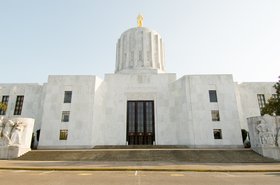A large government-backed data center campus could be coming to northeast England.
As reported by the Financial Times, the UK government has reportedly selected the former steel site in Teeside outside Middlesbrough.
A planning application for a data center totaling 500,000 sqm (5.38 million sq ft) was submitted locally late last month by Teesworks Ltd, the public-private partnership that is developing the site.
Ministers have reportedly selected the site – described as the largest brownfield development in Europe – as the location for its second so-called AI Growth Zone, with plans to build the “largest data center in Europe.”
Citing people familiar with the matter, the FT said that the Department for Science, Innovation and Technology was closely involved in negotiations with an unnamed major investor.
Regions across the UK were recently invited to bid to host the growth zones, announced earlier this year as part of the government’s AI Opportunities Action Plan. Hundreds of submissions from local authorities have been received to be the home of the five planned zones.
A person briefed on the plan said: “Teesside will be the UK’s main AI Growth Zone.” They added: “Officials have spoken to loads of big companies, including Anthropic, DeepMind, Microsoft, and Google.”
The Teesside Steelworks can trace its roots back to the 1870s. At its height, the area had 91 blast furnaces over a 10-mile radius. Some steel operations continue to this day, though 4,500 acres of brownfield land are being rejuvenated into an industrial zone and freeport known as Teesworks.
The FT suggested the data center plans may clash with those for a blue hydrogen and carbon capture plant in the same area. Energy secretary Ed Miliband is reportedly set to decide whether to grant permission to BP for the hydrogen plant next month.
The publication said the government’s net-zero agenda was clashing with its focus on luring AI and data center firms to the nation to fuel growth, with one unnamed official telling the FT the AI agenda would be “way more advanced if it wasn’t for Miliband’s focus on net zero.”
UK regions battle to host growth zones
The UK government recently said that the country needs to deploy “at least” 6GW of AI-capable data center capacity by 2030 to remain competitive. That 6GW represents a threefold increase in the data center capacity available in the UK today, the government said.
Each of the five planned AI Growth Zones is set to be capable of serving at least 500MW of demand by 2030, with at least one growth zone reportedly scaling to more than 1GW by 2030, according to the government.
The first AI Growth Zone will be built in Culham, Oxfordshire – home to the UK’s Atomic Energy Authority. The UK government has confirmed Scotland and Wales are set to host AI Growth Zones, but has yet to announce details.
Some 200 expressions of interest were reportedly submitted to potentially host the growth zones; some at projects already in the works, others at entirely new sites. Bids have come from all corners of the UK.
The local MP in North Ayrshire, Scotland, recently said that Irvine was in the running to become one of the AI Growth Zones. Dumfries and Galloway Council has also submitted its own bid, while a Glasgow MP has been pushing to bring a zone to the Scottish city – something potentially backed by Prime Minister Keir Starmer.
The University of York has also previously said it has bid to host a data center and growth zone at a planned AI and Clean Energy Campus at Drax Power Station. North Lincolnshire Council has also submitted a bid, while the South Yorkshire Mayoral Combined Authority (SYMCA) has pitched Doncaster as a potential host. The MP for Somerset has been pushing for his constituency to host an AI hub.
UK data center firm Kao recently pitched the northwest of England around Manchester – where the company is developing a facility – as a potential option. A local professor has said that nearby Liverpool should host an AI hub.
More in Government & Military
Read the orginal article: https://www.datacenterdynamics.com/en/news/uk-government-eyes-teesside-as-second-ai-data-center-hub-report/









